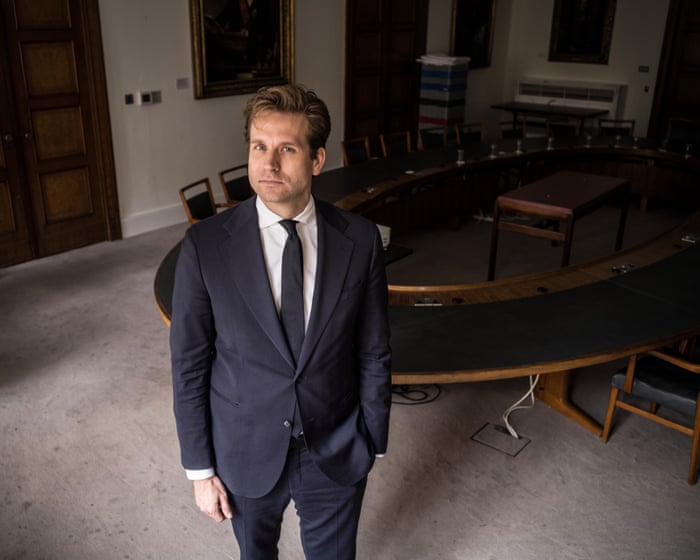A fierce dispute over the future of a Chinese-owned chipmaker in the Netherlands, which risked disrupting the global car industry, has been described as a “wake-up call to Europe and the West” by the minister at the center of the conflict.
Vincent Karremans, the Dutch economy minister, stated that the six-week standoff between the EU and Beijing regarding Nexperia and its crucial automotive semiconductor supplies has taught world leaders a stark lesson about their reliance on China. He expressed no regrets about the confrontation and would not alter his decisions even in hindsight. “There’s a lot of interest in exactly what happened,” he remarked. “It’s like an economic thriller.”
For the first time, he detailed how the trade dispute unfolded, recalling high-level discussions with his German counterpart, the car industry, and the US, as well as intelligence reports suggesting Nexperia was relocating parts of its operations from Hamburg to China.
The conflict began on September 30 when the Netherlands assumed supervisory control of Nexperia, citing risks to “European economic security.” This decision, based on a previously unused Cold War-era law, was made two days earlier at the highest levels of the Dutch government after thorough legal review.
Karremans denied any influence from the US, which had placed Nexperia on a list of companies facing import controls on September 29. “We were absolutely not pushed or pressured by the Americans to take action on this,” he asserted. “What we heard from the Americans was that they were entering a government shutdown and wanted to ensure Nexperia was included on the list.”
The Dutch intervention provoked a strong reaction from Beijing, which imposed a four-day ban on exports of Nexperia’s chips from China, most of which are finalized products. This move disrupted car manufacturers’ supply chains, causing production halts in Mexico and warnings from EU producers that they were “days away” from stoppages.
Following an agreement between Donald Trump and Chinese President Xi Jinping in South Korea at the end of last month, which allowed Beijing to resume chip supplies to Europe, the crisis seems to have subsided—for now.
“Now, for the short term, there’s a solution… and we’re very grateful for the steps that the Chinese authorities have taken on this,” Karremans said. However, he emphasized, “If I had been in the same position, with the knowledge I know now, I would have done the same thing again.”
Nexperia, formerly part of Philips, was acquired by China’s Wingtech in 2018. Concerns about its ability to export to the US arose in 2023 when the US informed the Netherlands that Wingtech was being considered for an “affiliate list” of companies posing potential national security threats.
“These restrictions were immense, so it was in our best interests to collaborate with the American and Chinese governments and Nexperia’s Chinese shareholder to find a solution,” Karremans explained.
The Dutch then engaged in talks with Zhang Xuezheng, founder of Wingtech and CEO of Nexperia in the Netherlands, to secure the company’s independence. Demands included forming an independent supervisory board and ensuring Zhang no longer held dual roles as CEO and head of human resources.
“I spoke to Mr. Zhang about this at the ministry last summer,” Karremans recalled. “It was one of my first meetings as economy minister. He assured me they were fully on board. We had a list of measures to implement, and then we would approach the Americans to affirm that this is a Dutch company.”
But in September, the situation escalated.Things took a dramatic turn.
“I had people coming to my office saying, ‘Minister, we need to talk to you,’ and they told me what Zhang was doing. They said he was moving intellectual property rights, firing people, and looking to relocate production from Hamburg to China.”
When asked who these people were, he said, “I can’t tell you who they were, but we have physical evidence that this relocation was happening.”
He argued that if Wingtech had moved its semiconductor wafer production to China, then “this interdependence that Europe had with China would have changed into a full dependency. That would have been very dangerous for Europe.”
After the situation with the Chinese escalated following the Nexperia intervention, Karrenmans spoke to Germany’s economy minister, Katherina Reiche. “She supported our action. She was very concerned about what this meant for the car industry.” Leaders in the EU, US, China, France, and elsewhere were also kept informed.
“We weren’t intending to go public on this. We wanted to solve this swiftly and silently,” Karremans said.
Beijing’s move to restore chip supplies over the weekend came after the US decided to pause sanctions for companies on its affiliate list. But the Dutch have yet to reverse their action on Nexperia, with Karremans hinting that nothing will happen until the first chips arrive in Europe.
“We are in direct touch with the German car industry and with other car manufacturers and clients of Nexperia. They will let us know when they receive the chips. And once the supply resumes and we are confident it will continue, then we’ll take the appropriate steps needed by the Dutch government to resolve this issue.”
Karremans hopes this “will serve as a wake-up call” about the dangers of depending on one country for essential technology or raw materials. Although his VVD party finished third in last month’s general election, he will remain economy minister until a new government is formed, which could take a year.
When Wingtech was asked about allegations that it was planning to move part of its physical production line in Hamburg to China, the company said it was moving ahead with an investment rollout in Germany, creating 150 new jobs, including 100 in R&D and 50 in production.
A spokesperson said, “Wingtech’s $200 million investment plan for the Hamburg wafer fabrication facility, announced in 2024, is progressing steadily. As the new production lines start to ramp up, we were expecting to continue expanding our operational team, a development which has since been sidelined due to the Dutch government’s intervention.”
Frequently Asked Questions
Of course Here is a list of FAQs about the Dutch ministers statement regarding the car chip dispute with China designed to be clear and helpful for a range of readers
BeginnerLevel Questions
1 Who is the Dutch minister involved in this dispute
The minister is Micky Adriaansens the Minister of Economic Affairs and Climate Policy for the Netherlands
2 What is the car chip dispute about
Its about restrictions on the export of advanced semiconductor manufacturing technology from the Netherlands to China These chips are crucial for modern cars and China is a major manufacturer
3 What did the Dutch minister mean by I would repeat every action
She meant that given the same circumstances and information she would make the same decisions again Its a strong statement of support for her governments policy to restrict these exports on national security grounds
4 Why is the Netherlands involved in a chip dispute
The Netherlands is home to ASML one of the worlds most critical companies ASML makes the advanced machines needed to produce the most powerful computer chips making Dutch export policy very important globally
IntermediateLevel Questions
5 What are the main reasons behind the Dutch governments decision
The primary reasons are aligned with US and allied concerns about national security There are fears that advanced chips could be used to enhance Chinas military capabilities The decision is not specifically about cars but about the underlying dualuse technology
6 How does this dispute affect the average person
In the short term it may not be directly noticeable In the long term it could affect the global supply chain for cars and electronics potentially leading to higher prices or delays for certain hightech vehicles especially electric cars that rely heavily on advanced chips
7 What was Chinas reaction to this stance
China has strongly criticized the restrictions calling them an abuse of export control measures and a violation of international trade rules They see it as a targeted effort to hinder their technological and economic development
8 What are export controls in simple terms
Export controls are government rules that limit or ban the sale of specific goods services or technology to other countries usually to protect national security or prevent the proliferation of weapons
Advanced Strategic Questions
9 How does this statement impact the geopolitical relationship between the EU and China
It highlights



